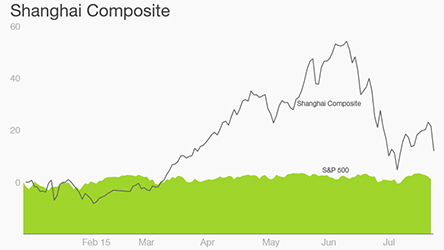How will China's stock market crash affect Hong Kong property?
- OKAY.com | 24 July 2015

On June 12 2015, China’s stock market underwent a crash that led to the Shanghai Stock Exchange plummeting more than 30% in value in the June-July period. The crash was reportedly due to a result of a huge influx of individual, amateur investors suddenly flooding the market in conjunction with the diminishing strength of China’s economy. It’s no secret that Mainland Chinese make up a large portion of investors in Hong Kong real estate, with figure estimates reaching 20% for the proportion of Mainland buyers in luxury property projects in the first half of 2015 alone. As such, questions will naturally be asked about the implications of the crash on the Hong Kong Property Market. This report provides a short summary of news and opinions regarding the subject.

How will China's stock market crash affect Hong Kong property?
On July 9 2015, South China Morning Post reported the opinions of both Charles Chan and Sammy Po Siu-ming, the former being Savills’ Managing Director for Valuation and Professional Services and the latter being the Chief Executive of Midland Realty's Residential Department. Whilst Chan stated that property prices will be impacted minimally as long as the stock market rebounds significantly, Po’s outlook was comparatively bleak. Presuming that buying sentiment will be affected by the crash, Po expected sales volume in luxury homes to “drop by up to 20 per cent month on month”.
A few days later, 28Hse.com reported diametrically opposed optimistic and pessimistic opinions coming from big names in the property market. Lei Ting, Vice Managing Director of Sun Hung Kai Properties, stated that because housing is a long term investment, short term stock market volatility will not negatively affect the property market. In fact, because housing is seen as a safe long term investment, there may even be an influx of investors transferring funds into the property market. However, Shih Wing-Ching, Founder of Centaline Property Agency voiced pessimistic sentiments, sharing Po Siu-ming’s worries about sales volume in luxury homes. Shih stated that whilst luxury prices might not drop, luxury property buyers are more often than not engaged with the stock market. So, because of the stock market crash, while prices won’t necessarily drop, the number of transactions for luxury properties is expected to fall, and the effect will only be exacerbated if the situation comes without any significant recovery from the stock market.
While it’s too early to verify the veracity of any of the above statements, the following paragraphs aim to report on recent property market activity to assess any surface impact. According to a press release by the Hong Kong Land Registry, 5,776 residential units were sold during June, 11.8% more than the number of residential units sold in May, despite the market crash occurring in mid-June.
Mainland buyers also appear to be looking at other markets, with The Guardian reporting a recent increased interest in Australian, British, and Canadian property markets following the stock market crash. Australia and Canada in particular are becoming more popular amongst Chinese investors because of their weakened currency against the RMB.
While there has been increased interest in foreign property markets, there have also been cases where formerly interested Chinese investors lowered their budgets or attempted to cancel deals because of their losses in the stock market. The volatile state of the Chinese stock market in conjunction with political intervention, such as the recent 6-month ban on major company shareholders from selling shares, make it difficult to predict how exactly Hong Kong and foreign property markets will fare in the aftermath. Returning to the opinions discussed earlier in this article, it was generally agreed that what happens next is heavily dependent on whether or not China can make a real comeback in the stock market and how soon.
We Want to Meet You
Contact us to schedule a confidential conversation about how OKAY.com can partner with you




